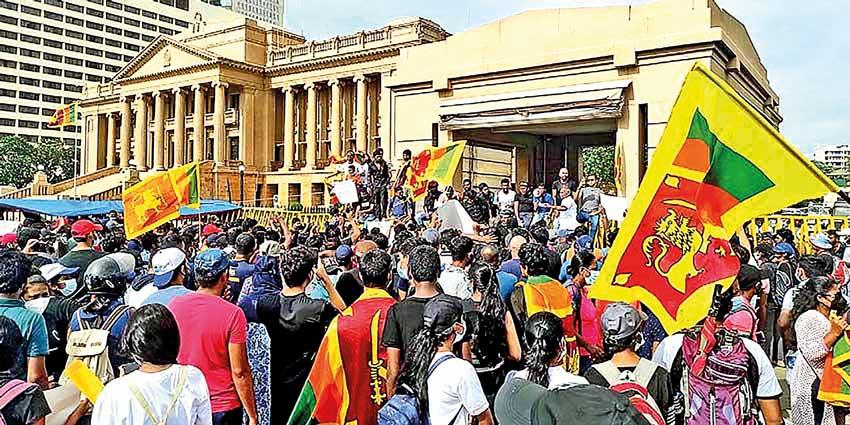Reply To:
Name - Reply Comment
Last Updated : 2024-05-17 12:09:00

A large number of people seen at a protest site calling for a ‘system change’ (File photo)
 Ram Manikkalingam, Visiting Professor of Political Science at the University of Amsterdam has sketched ‘An Agenda for Change’ (Sunday Times, July 3, 2022). Now change is an easy and cheap term. For some, it is about regime change. For some, it is about ousting the Rajapaksa family. Some talk of system change which of course implies at some level constitutional reform. Ram belongs to the last category.
Ram Manikkalingam, Visiting Professor of Political Science at the University of Amsterdam has sketched ‘An Agenda for Change’ (Sunday Times, July 3, 2022). Now change is an easy and cheap term. For some, it is about regime change. For some, it is about ousting the Rajapaksa family. Some talk of system change which of course implies at some level constitutional reform. Ram belongs to the last category.
We must note that systems are not only about politics but about political economy. If you want an economic system or a model of development kept intact but want some alteration in the political rooms, some may argue it is cosmetic or a small and all things considered meaningless consolation prize that’s sought. Ram is not talking about the large prize(s), but a generous reading would be that he believes the political reforms (in the form of constitutional changes) is a necessary precondition for taking on the more endearing and pernicious ills in the political-economic terrain. In this limited and limiting sense, Ram pushes a tired button: ‘Sri Lanka’s travails are directly linked to the political hold one family has had over the country.’

I believe that any professor of political science with any understanding of post-independence politics in Sri Lanka would be hard-pressed to conclude that Sri Lanka’s travails were birthed and nurtured by the Rajapaksa family and the Rajapaksa family alone. There’s ample academic literature to prove otherwise. To put it mildly, the Rajapaksas, even if one were to date it all back to 2005 and ignore what happened from 2015 to 2019, were but one set of custodians over a flawed, short-sighted and in the final instance servile paradigm of development. Toss in the forex crisis, balance of trade crisis, food and energy security/sovereignty crisis etc., and there’ll be many more families and individuals crying out for naming and shaming. To reduce it all to the Rajapaksas and at the present moment to Gotabaya Rajapaksa is easy. And silly.
But let’s play with Ram’s thesis. He poses three obstacles to political and economic reform: a) protesters’ antipathy to engagement with parliamentarians, b) Gotabaya not resigning, and c) international financial institutions, in particular the IMF, being reluctant to move due to ‘b’. This articulation betrays Ram’s prejudices and largely misplaced faith in the IMF, but let’s put all that aside. Ram claims: ‘The challenge in the coming period will be to combine political pressure from the protesters, institutional pressure from parliament and financial pressure from IFIs to enact political reform.’ Political reform, then, according to Ram, is about getting Gotabaya to resign and then amend the constitution.
I believe that any professor of political science with any understanding of post-independence politics in Sri Lanka would be hard-pressed to conclude that Sri Lanka’s travails were birthed and nurtured by the Rajapaksa family and the Rajapaksa family alone
He then outlines the ‘next steps.’ First, a shadow government’ initiated by the SJB, TNA and JVP but including ‘political parties, social movements and professional associations.’ Nothing wrong with that. Ram then talks of this shadow government coming up with a broad practical programme and pushing the government to effect ‘real political and economic reform’ which includes economic restructuring, ethnic co-existence and political reform. Maybe one day Ram will detail his preferences with regard to economic restructuring, ethnic co-existence and political reform. For now, he has deliberately and not illogically and quite in the spirit of democracy and liberalism left out the details.
One need not be fooled, though. Political reform, as per his thesis, must begin with the ousting of Gotabaya Rajapaksa. This can be done, in the event, he does not resign, through impeachment, defeat in an election or through extra-constitutional means. Elections are out of the question at this point. Revolution is fine. If things are anarchical right now and anarchy is proposed to be replaced by a different kind of anarchy then it is silly to talk of constitutional reform; so Ram isn’t really into all that. Impeachment is certainly a challenge given parliamentary arithmetic. He has detailed the necessary: ‘combine political pressure from the protesters, institutional pressure from parliament and financial pressure from IFIs to enact political reform.’
Fact: there’s a palpable lack of coherence among the protestors. Strangest of bedfellows, Ram would agree although he implies much less. They are united by a slogan which echoes Ram’s necessary precondition: ousting Gotabaya. Ram has not given them stellar character certificates but he’s avoided talking about credentials that aren’t quite swoon-worthy. I mean, the SJB, TNA and JVP as a combined ‘vanguard for change’? Come on! They’ve had their day, although in other avatars or as adjuncts of regimes, and they did jack-all about economic restructuring, ethnic co-existence and political reform, Ram knows this. It’s these very people from whom Ram envisages ‘institutional pressure from parliament.’ Again, for economic restricting, ethnic co-existence and political reform’? Really? Any chance they will be happy about being subject to the will of the people? Unlikely, given track records.
Pressure from international financial institutions: now this is tangible. They have the carrot, they have the stick. And they are dealing with those in power and those out of power who are enslaved to all the lies and half-truths of
neoliberal doctrines.
Through it all, one detects a slavish deference to the Bretton Woods Institutions and the relevant economic theories and development models which have proven to be disastrous. Through it all, one detects a sly attempt to co-opt and render meaningless ‘the people.’ Through it all there’s glossing over details. Through it all, one cannot fail to see an attempt to reduce all Sri Lanka’s problems to the whims, fancies and whatnots of a single family and an absolute faith in the very institutions that installed the prevailing economic structure of Sri Lanka.
Pressure from protesters for what? This is the question. What kind of coherence and for what purpose? That’s the other question. Within the constitutional frame or outside it? That’s another question. Same old, same old in new bottles, is something to be considered and logically abandoned. The proposal is a shortcut for system-intact with some placebos to placate the incredulous.
malindadocs@gmail.com

Add comment
Comments will be edited (grammar, spelling and slang) and authorized at the discretion of Daily Mirror online. The website also has the right not to publish selected comments.
Reply To:
Name - Reply Comment
The state-run loss-making State Mortgage & Investment Bank (SMIB) has reveale
US authorities are currently reviewing the manifest of every cargo aboard MV
On March 26, a couple arriving from Thailand was arrested with 88 live animal
According to villagers from Naula-Moragolla out of 105 families 80 can afford

2 hours ago